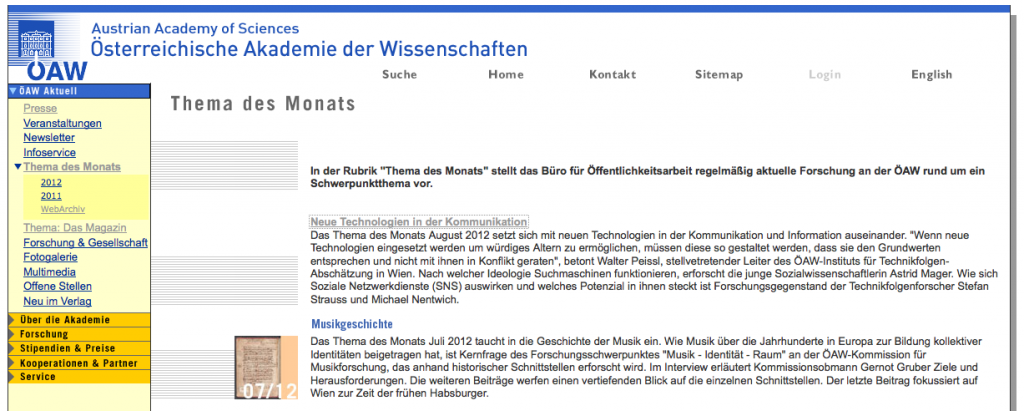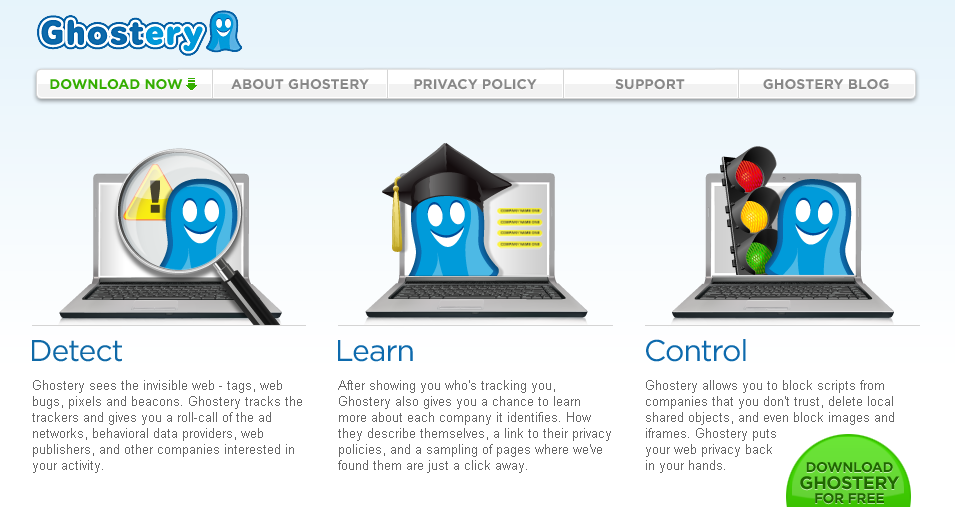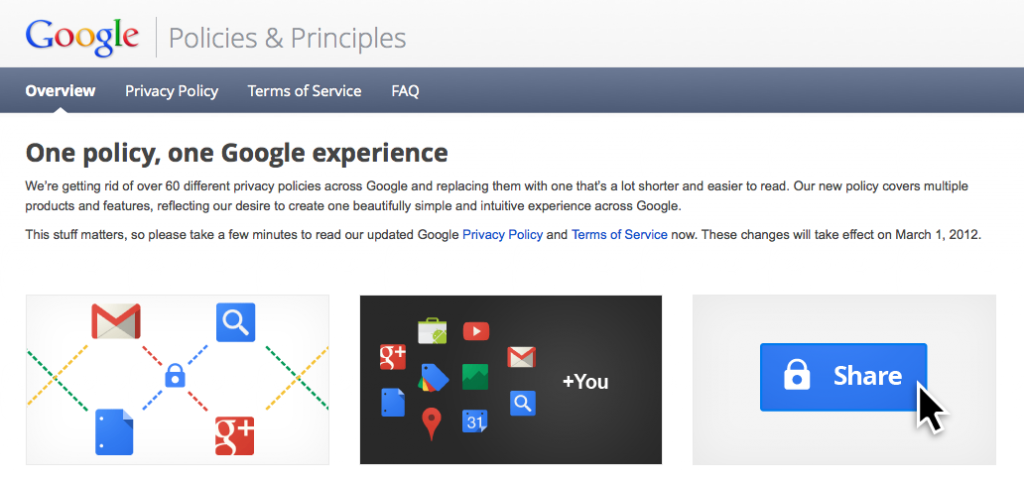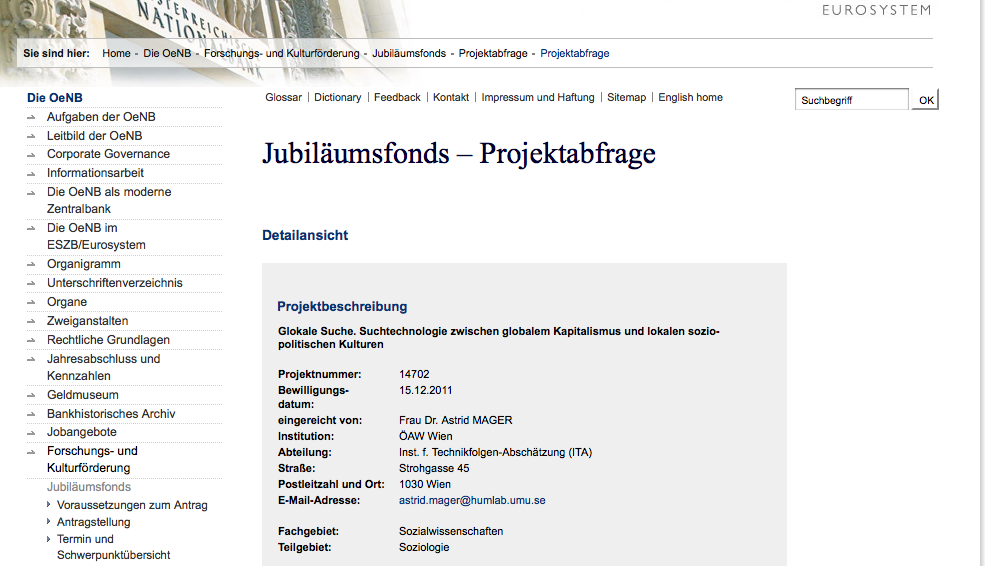Each month the Austrian Academy of Sciences defines and discusses a “topic of the month”. The current issue deals with new communication technologies and presents three ITA projects. Besides my own project “Glocal Search“, the EU projects “Value Ageing” and “European Perspectives on Cloud Computing and Social Networks” are featured. The ÖAW portraits of the projects can be found online or in the paper magazine “Thema Forschung” (October). Enjoy reading!
Tag Archives: privacy
Pics & press coverage from APA eBusiness event
Last week we had a very lively discussion on new media – search engines and facebook – and privacy (see blog post below). Central questions were how these new online services use personal data to create profit, what privacy violations that involves, and how to meet these challenges with (EU) regulations and strategies of digital self-defense. It was a highly diverse, but really interesting combination of people on the round table including Johannes Juranek (CMS), Helmut Waitzer (Navax), Max Schrems (Initiative “Europa gegen Facebook”) und Markus Deutsch (WKO) and me.
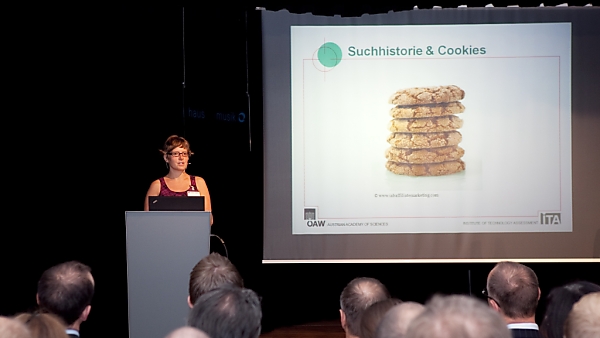 © photo credit: APA-Fotoservice/Rossboth
© photo credit: APA-Fotoservice/Rossboth
Check out the fotos & press coverage (e.g. APA Science & futurezone) of the event for more information!
Talk at eBusiness Community Event/ APA
Next week I’ll be giving the “Impulsreferat” at the eBusiness Community Event organized by the Austrian Press Agency (APA). I’m already curious how the Austrian eBusiness community will react to my rather critical reflections on corporate Internet services and their business models. Guess it will be fun!
Here’s the abstract of the evening (from the EBC website) and my “statement” for the presentation and the panel discussion that follows (in German):
Privacy: Wie Daten zur Ware und Währung werden.
In etwa zehn Jahren werden digitalisierte Produkte und Dienstleistungen laut Experten weltweit für ein Viertel der jeweiligen Bruttoinlandsprodukte verantwortlich sein. Dieser Trend führt dazu, dass immer mehr persönliche Daten im Netz herumschwirren.
Auf Unternehmen kommen dadurch große Herausforderungen zu: Sie müssen den Kunden wie auch dem Gesetzgeber nachweisen, dass sie für Sicherheit und Schutz der Privatsphäre sorgen. Schärfere Vorgaben in diesen Bereichen könnten den Entscheidern zusätzlich das Leben erschweren.
Aber auch im Privatleben tauchen neue Fragen auf: Wie viele Identitäten, Accounts und Passwörter hat man eigentlich? Wie wird man künftig damit umgehen? Wie komplex ist es inzwischen, sein digitales Leben im Griff zu haben? Welche Szenarien gibt es für den Datenschutz der Zukunft?
Datum: Donnerstag, 26. Juli 2012
Ort: Haus der Musik, Seilerstätte 30, 1010 Wien
Happy Hour: ab 18:30 Uhr
Podiumsdiskussion: 19:30 – 21:00 Uhr, Vortragssaal, Dachgeschoß
Bitte um Anmeldung unter ebc@apa.at
Statement:
Globale Internetriesen wie Google, Facebook und co. spielen eine zentrale Rolle in gegenwärtigen online Praktiken von UserInnen. Gleichzeitig haben diese Akteure neue Geschäftsmodelle geschaffen, deren Grundlage zielgruppenspezifische Werbung; und damit Userdaten und deren Verarbeitung und wirtschaftliche Ausbeutung darstellen. Kommerzielle Internettechnologien können damit als Spiegel unseres kapitalistischen Wirtschaftssystems betrachtet werden. Diese Informationsökonomie hat drastische gesellschaftspolitische Auswirkungen, insbesondere auf historisch gewachsene und kulturell bedingte Bereiche wie Privatsphäre, Datenschutz und Identität. Globale Wirtschaft und lokale Gesellschaftspolitik stehen hier in einem interessanten Spannungsverhältnis. Welche Maßnahmen hier greifen können – von digitaler Selbstverteidigung, Privacy by Design, bis hin zu neuer Gesetzgebung – müssen wir lokal, EU-weit und global diskutieren, wenn wir die Kontrolle über unsere Daten in Zukunft nicht völlig an „den Markt“ abgeben wollen.
Come along if you’re in town!
“Black Box Suchmaschine” Video Archive
Yesterday we had a great event at the Museumsquartier in Vienna: our “Themenabend Black Box Suchmaschine” (see program below). For those who missed the event and can’t wait to watch it online (or parts of it 😉 ) we archived the video stream here:
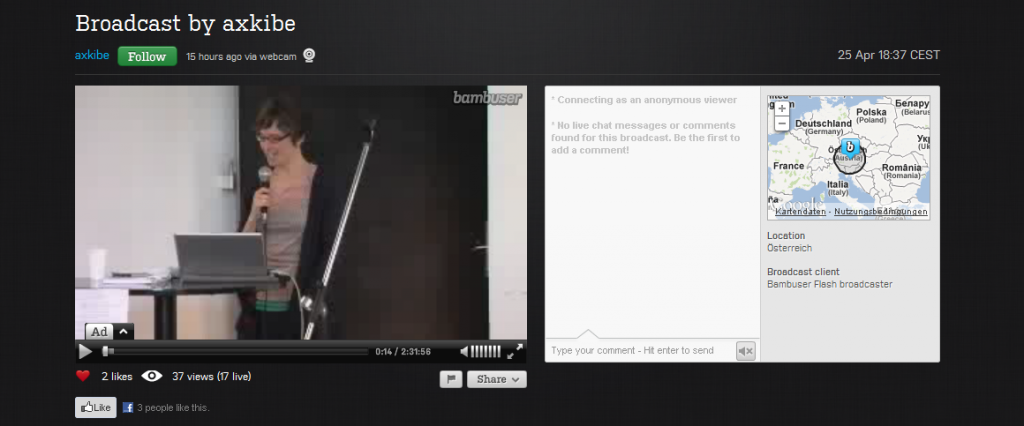 Thanks to Axel Kittenberger for the technical support & the stream! & everyone, who participated and made this evening a great contribution to the politics of search, modes of ordering knowledge, privacy and regulation (which triggered a heated debate, as you can see towards the end of the video)..
Thanks to Axel Kittenberger for the technical support & the stream! & everyone, who participated and made this evening a great contribution to the politics of search, modes of ordering knowledge, privacy and regulation (which triggered a heated debate, as you can see towards the end of the video)..
Finally, René König presented the newly formed network Re:Search – a mailinglist established in co-operation with the Institute of Network Cultures, Amsterdam (Geert Lovink). Subscribing to the list is only the first step, further activities will follow – Blog posts on the Society of the Query Blog, events, a publication hopefully! So stay tuned 😉
Themenabend: Black Box Suchmaschine, 25.4.2012, 18.30, MQ/ Raum D
I’m already looking forward to the event “Black Box Suchmaschine. Google & co. im gesellschaftspolitischen Kontext” I’m organizing together with René König (in cooperation with our research group Internet Research).
Here’s the abstract & the program featuring great speakers!!! (in German)
Termin: 25.04.2012, 18.30
Ort: Museumsquartier Wien, Raum D
Zudem Online-Anbindung durch Streaming und/oder Microblogging.
(Image credit: Anja Goller. Something interesting..)
Suchmaschinen wie Google prägen das Netz wie kaum ein anderer Dienst. Zwar gewinnen soziale Netzwerkseiten wie Facebook zunehmend an Bedeutung, doch werden Nutzungsstatistiken noch immer von Suchmaschinen dominiert. „Googeln“ ist eine alltägliche Praxis geworden, die nur selten hinterfragt wird. Dabei strukturieren Suchmaschinen unseren Zugang zu Netzinformationen maßgeblich. In der Privatwirtschaft ist diese Erkenntnis längst etabliert und Firmen geben viel Geld für sogenannte Suchmaschinenoptimierung aus. Aus gutem Grund, denn bisherige Nutzungsforschung zeigt deutlich, dass mehrheitlich den hierarchischen Ordnungen der Ergebnislisten gefolgt wird. Gleichzeitig wird dabei häufig eine fragwürdige Datenpolitik betrieben, die immer wieder für Kontroversen sorgt. Erst kürzlich hat sich etwa Google mit seinen geänderten Nutzungsbedingungen wieder ins Zentrum des öffentlichen Interesses katapultiert. Denn seit März müssen angemeldete NutzerInnen zustimmen, dass das Unternehmen umfangreiche User-Daten aus seinen verschiedenen Diensten (dazu gehört nicht nur Google Web Search sondern auch beispielsweise Google Maps, Google Mail, YouTube, Google+ uvm.) zusammenführt, was DatenschützerInnen auf die Barrikaden steigen lässt. Entsprechend kommt Suchmaschinen wie Google eine erhebliche gesellschaftspolitische Bedeutung zu, mit der sich unser Themenabend „Black Box Suchmaschine“ aus unterschiedlichen Blickwinkeln auseinander setzen möchte. Dazu geben WissenschaftlerInnen Einblicke in aktuelle Forschungen, die wir zur Diskussion stellen wollen. Schließlich wird im Anschluss das Netzwerk „[Re]Search“ gegründet, an dem sich alle Interessierten beteiligen können.
Programm
18.30 Begrüßung
18.35 Keynote:
Asymmetrische Beziehungen – Klassifizierungskämpfe in Informationsgesellschaften
Konrad Becker
Institut für neue Kulturtechnologien & World-Information.Org (Wien)
18.50-19.30 Block 1: Wie Suchmaschinen unser Wissen gestalten
Ganz persönlich? Alte und neue Soziometriken der Suchmaschinen
Katja Mayer
Universität Wien, Wissenschaftsforschung
Das suchende Individuum – Subjektive Perspektiven zwischen globalen Strukturen und Personalisierung
René König
Karlsruher Institut für Technologie
Vertrauen, Diversität und Empfehlungssoftware
Judith Simon
Universität Wien / Karlsruher Institut für Technologie
19.30-20.10 Block 2: Wie Google & co. mit unseren Daten Geld verdienen
Suche und Werbung: Fundamentale Interessenkonflikte im Google-Empire
Bernhard Rieder
Universität Amsterdam
Suchmaschinen im Spannungsfeld von globaler Informationsökonomie und lokaler Gesellschaftspolitik
Astrid Mager
Österreichische Akademie der Wissenschaften
Auf der (Web-)Suche nach der informationellen Selbstbestimmung – Privacy by Design als Regulierungsansatz?
Jaro Sterbik-Lamina, Stefan Strauß
Österreichische Akademie der Wissenschaften
20.10 Podiumsdiskussion
Moderierte Podiumsdiskussion mit Publikumseinbindung (auch online) zu quer liegenden Fragen der präsentierten Themenschwerpunkte. Anschließend Gründung des Netzwerks [Re]Search für alle Interessierten.
verfassungsklage.at
I just filled in, printed, signed and sent out the online form provided on the website verfassungsklage.at (initiated by AKVorrat & the Austrian Green Party). It should help to topple the data retention law by bringing it to the Austrian constitutional court. This may not necessarily bring down data retention in the whole European Union, but it’s a first step. The more countries resign from the law, the more likely the EU will reconsider this terrible law, which severely intervenes in fundamental rights. If you agree that Austria should follow the countries Germany, Czech Republic, Bulgaria and Romania in bringing down the law, then quickly go to the website and follow the instructions:
Ghostery & more
Last week I attended the Unlike Us conference in lovely Amsterdam. The event, aimed at bringing together researchers, activists and artists concerned with Social Media Monopolies and their Alternatives, was covered pretty well by bloggers on site, as you can see here. Instead of repeating their work by blogging about the whole event, I just want to point you to a single tool I learned about: Ghostery.
Ghostery helps you tracking the trackers and gain back control over your privacy. “Ghostery tracks the trackers and gives you a roll-call of the ad networks, behavioral data providers, web publishers, and other companies interested in your activity.”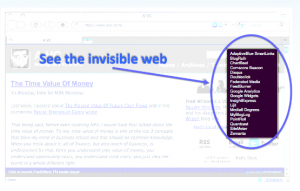 It’s a browser plug-in (for various browsers) that shows you the invisible web – tags, web bugs, pixels and beacons that are included on web pages in order to get an idea of your online behavior – and helps you to block and/ or manage them. Instead of passively running in the background, the app brings them to the foreground, and hence puts you in the active position of handling them. You should really check it out, it’s the best privacy tool I’ve seen in a really long time!!!
It’s a browser plug-in (for various browsers) that shows you the invisible web – tags, web bugs, pixels and beacons that are included on web pages in order to get an idea of your online behavior – and helps you to block and/ or manage them. Instead of passively running in the background, the app brings them to the foreground, and hence puts you in the active position of handling them. You should really check it out, it’s the best privacy tool I’ve seen in a really long time!!!
Besides, it was very interesting to see Max Schrems talking about Facebook vs. Europe. He’s an Austrian law student, but pretty professional in what he does. I hope he manages to bring Facebook to its knees! Blogpost on his talk here.
Finally, I attended the Oxford Internet Institute (OII) conference “Interdisciplinary Insights on the Social Science of Digital Research”, where I talked about the Performative Character of Digital Methods (see blog post below). It was a great event, which covered a range of digital methods and their ethical implications. I particularly enjoyed seeing Mike Thelwall talking about his network mapping tools since I’ve read about his work for quite some time now.
article in ITA newsletter
That’s the article in the current ITA newsletter (only in German unfortunately). It’s on my project GLOCAL SEARCH and related issues discussed in the blogpost below.
“Glokale” Perspektive auf Google & co.
Erst kürzlich ist Google mit seinen geänderten Datenschutzbestimmungen und Nutzungsbedingungen wieder ins Zentrum des öffentlichen Interesses geraten. Ob dies aus Transparenz- oder PR-Gründen der Fall war, muss an dieser Stelle offen bleiben. Welche Konsequenzen diese ab März gültigen Veränderungen sowohl auf globaler als auch auf lokaler Ebene nach sich ziehen, wird zentraler Bestandteil eines neuen Projekts am ITA sein: „Glocal Search“ startet zeitgleich mit In-Kraft-Treten der genannten Richtlinien.
Der gesamte Text findet sich auf der ITA Website zum download.
Google’s new privacy policy: quick solutions and long-term measures
Tomorrow Google starts with its new privacy policy and terms of service. “We’re getting rid of over 60 different privacy policies across Google and replacing them with one that’s a lot shorter and easier to read” Google clearly states on its website. 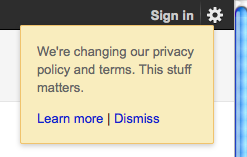 While Google argues this concentration of privacy policies would result in a “simple product experience that does what you need”, criticism may be raised concerning fundamental socio-political implications this policy shift triggers. Google used links, search histories and click rates to personalize search results and – most of all – sponsored links in the past. From tomorrow onwards it will additionally integrate data collected from other services – including Google Mail, Google Maps, YouTube, the social networking site Google+ and many more – to target search results and ads to users’ interests and desires.
While Google argues this concentration of privacy policies would result in a “simple product experience that does what you need”, criticism may be raised concerning fundamental socio-political implications this policy shift triggers. Google used links, search histories and click rates to personalize search results and – most of all – sponsored links in the past. From tomorrow onwards it will additionally integrate data collected from other services – including Google Mail, Google Maps, YouTube, the social networking site Google+ and many more – to target search results and ads to users’ interests and desires.
If you want to protect yourself from Google’s new privacy policy today is your last chance according to John Thomas Didymus from the Digital Journal. Just follow the instructions described in the article to delete your Google Browsing History, “along with any damning information therein”. Contrary to quick solutions offering individual opting-out strategies, however, long-term measures would be needed to seriously challenge a range of implications this policy shift triggers on a societal level, both globally and locally:
First, the increased collection and aggregation of users data on a global scale leads to even more localized and personalized search results, which may narrow or “censor” our web information landscape according to our own, local, (partly arbitrary) parameters. Second, the new privacy policy may be seen as yet another step into the direction of Google’s profit maximization. Global companies like Google create money by selling “user profiles” (generated from massive data collections) to advertising clients and hence turn both web information and users into a commodity. Finally, the new settings raise new privacy issues and data protection 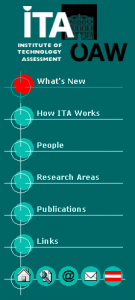 challenges on a local level, where stricter regulations exist than in the US. While corporate search engines succeed very well in localizing their products and services, local policy makers and data protection experts still seem to be overwhelmed by global developments in the information economy.
challenges on a local level, where stricter regulations exist than in the US. While corporate search engines succeed very well in localizing their products and services, local policy makers and data protection experts still seem to be overwhelmed by global developments in the information economy.
These tensions between global economic trends and local socio-political cultures and questions how to achieve long-term measures for creating a more sustainable future of search – specifially focusing on the Austrian context – lie at the heart of my new project “Glocal Search. Search engines at the intersection of global capitalism and local socio-political cultures”. This project will start tomorrow at the Institute of Technology Assessement (ITA), Austrian Academy of Sciences, in Vienna – at the same time as Google’s new privacy settings take effect. The project is funded by the Jubiläumsfonds of the Oesterreichische Nationalbank (OeNB), project number 14702. A detailed description of the project and “glocal” implications search engines pose will soon be published in the ITA newsletter (March issue). I will post the article on my blog once it has been put online. Further, I’ll put up a project page later this month. So stay tuned!
merry xmas to myself!!!
Just before xmas I got the great great news that my 2-year research project “Glocal Search. Search technology at the intersection of global capitalism and local socio-political cultures” got funded by the Österreichische Nationalbank (OeNB). YAY. I’m really looking forward to 2012 now, where I’ll be in Vienna again!!!!! More information to follow.. stay tuned!

